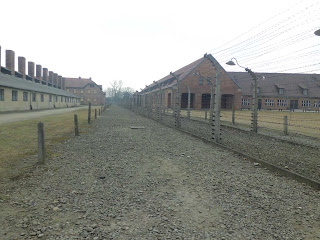10 am. Thursday, April 19, 2012.
A siren wails. We stop and stand
in silence. Children close their math
books, their small chairs scraping the floor as they stand. Doctors put down
their stethoscopes and pause. Cab drivers stop on the highways. Busses screech
to a halt, passengers put down their Sudoku, fold their newspapers, close their cell
phones. TV commercials hawking the
driest diapers flicker off.
Sirens wail from Eilat to Kiryat Shemona and from Tel Aviv’s
bustling bursa stock exchange to the dusty cow sheds in the Jezriel Valley. We
stop. We think. We remember. We cry.
In Poland just one month ago, I stood in fields that are
filled with the bones, the ashes, the screams and the fears of millions of
innocent souls. Of mothers whose hands were torn from their children, of small
babies whose light bodies were tossed in the air, fair game for target practice,
of bright young men who were entitled to many years to accomplish, to
contribute, to love and to laugh; and whose futures were snuffed before their
lives even began.
We do not even know many of their names. Entire families
were wiped out. Villages erased. Communities that had flourished for 500 years disappeared.
17,000 of them. All that remains are
17,000 jagged rocks in the killing fields of Treblinka, the town’s names etched
in stone.
 |
| Forest outside Tykocyn where 1,700 Jews were shot one August morning. |
I stood beside these mass graves atop soil that still bleeds
and I listened, my breath shallow, my throat full, my eyes wide. I heard
nothing. I felt fear. And in Auschwitz I
saw that doll. I saw the human hair that had been shaved off the cargo before
it was liquidated, carefully collected and stored. I saw the blue and red pots
and pans, the graters, the peelers, the shavers, the brushes, the duplicity.
And I saw that doll. Its leg broken off, rosy cheeks dirtied, eyes frozen, yet still wearing a fancy lace petticoat and an embroidered, starched skirt. As I stared at it, I thought of the little girl whose eyes lit up when she
was given the doll and who caressed it
and dressed it with care and took it everywhere, even to Auschwitz.
I saw a little girl with a doll. She had two long ponytails
just like her doll. She wore shiny patent shoes, white tights and a pretty pink
dress. She loved her doll and skipped along with it, then ran back to her
mother for a hug. Her mother loved her and this lovely girl felt so secure, so
happy. She kissed her doll, and sat it down next to her. Tears ran down my
cheeks. I know how deep this love is and I cannot imagine how painful it is to
lose it. I will never forget that broken
doll sitting in a glass showcase.
As the siren stops, I hear other sirens from distant towns echoing
across the fields. Busses start up and soap operas fill TV screens. Cranes
swing concrete blocks, building homes and apartments and orffice towers. Children
run out for recess and the stock exchange continues to trade.
I look up. Palms sway in an azure sky, birds sing in the
jacarandas and a breeze flutters the petals of orange blossoms. It is April and this country is a blooming palette
of vivid colors.

No comments:
Post a Comment
Your comments are always welcome.